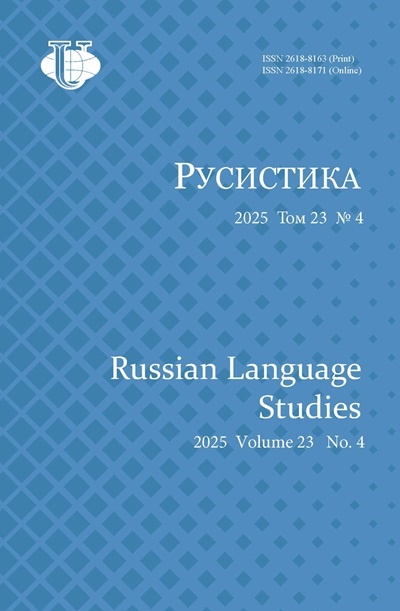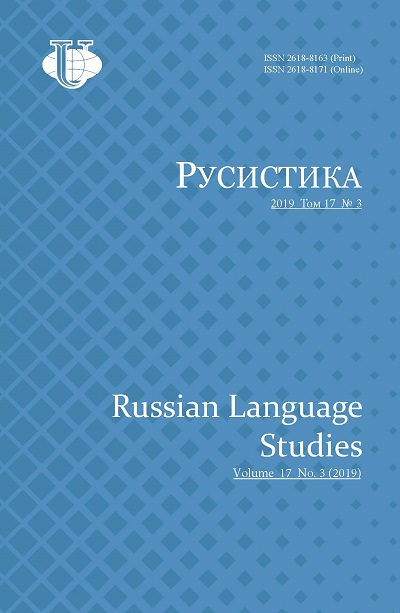Том 17, № 3 (2019)
- Год: 2019
- Статей: 8
- URL: https://journals.rudn.ru/russian-language-studies/issue/view/1206
- DOI: https://doi.org/10.22363/2618-8163-2019-17-3
Весь выпуск
Научная дискуссия: позиция ученого
Современные российские лингвисты: библиометрический анализ публикационной активности и цитируемости
Аннотация
Проблема объективной оценки результатов научной работы, в том числе вопрос о возможности использования библиометрической (статистической, математической) оценки публикационной активности, цитируемости и - в конечном счете - авторитета ученых, в последние десятилетия находится в центре дискуссий. В статье представлены материалы библиометрического анализа публикационной активности и цитируемости широко известных современных языковедов, основанные на показателях российского индекса научного цитирования. Сопоставлены данные ранжирования лингвистов по количеству публикаций, количеству цитирований и индексу Хирша ( h -индекс). Выделены факторы, способствующие активной цитируемости и одновременно высокому индексу Хирша: значительный авторитет соответствующих журналов и издательств, принадлежность к активно развивающимся научным направлениям, работа в ведущих университетах и академических научных институтах. Материалы статьи могут быть использованы при обсуждении критериев эффективности работы языковедов.
 267-275
267-275


Обзорная статья
Российская словообразовательная наука в XXI веке
Аннотация
В статье представлен обзор работ по словообразованию и морфемике начала XXI века. Рассматриваются разные аспекты современной словообразовательной науки в исследовании единиц морфемной и словообразовательной систем (словообразовательных аффиксов, производных слов, словообразовательных типов, способов словообразования, словообразовательных гнезд): структурно-семантический, синхронно-диахронный, динамический. Особое внимание обращается на работы по неологии, в которых новообразования исследуются в социокультурном, лингвокультурологическом и лингвопрагматическом аспектах.
 276-299
276-299


Актуальные проблемы изучения русского языка
Русскоязычный правовой дискурс: правонарушение, совершаемое вербальным способом
Аннотация
Статья посвящена проблемным вопросам терминологического пространства современной юрислингвистики, в частности понятию «правонарушение, совершаемое вербальным способом», которое активно культивируется исследователями и экспертами-практиками. В современной научной и методической литературе отсутствует общепринятая дефиниция данной лингвоправовой категории, что приводит к вариативности ее понимания. В качестве практического исследовательского материала были использованы статьи Уголовного кодекса (УК) Республики Беларусь. Методология работы включала метод сплошной выборки фактического материала и его статистическую обработку, дискурс-анализ, систематизацию, частично - метод параметризации и семантико-стилистического анализа. В настоящей работе вербальный способ деяния рассматривается сквозь призму оценки предмета правового контроля, в качестве которого для рассматриваемого вида правонарушения выступает текст в самом широком его понимании. Такой подход призван нивелировать терминологическую лакуну и не допустить появления дублирующих понятий (например, «вербальное преступление»). Акцент, сделанный на предметной составляющей преступного действия, позволяет выявить три типа таких правонарушений, совершаемых: 1) преимущественно вербальным способом (доминируют в уголовном законодательстве); 2) часто вербальным способом (достаточно распространены, но в два раза реже встречается в УК, нежели первый тип); 3) вербальным способом (сопоставимы по количественным показателям со вторым типом). Результаты научного исследования представляются важными для развития собственного терминологического аппарата юрислингвистики в целом и лингвоправовой экспертологии в частности.
 300-314
300-314


Русская речь и ее реальные исходные единицы
Аннотация
Статья посвящена основным вопросам русской речи: ее порождению, исходным единицам и их восприятию. В ней отображено последовательное разграничение лингвистических сфер языка, речи и их единиц. Отмечена целесообразность разграничения языковедения и речеведения как двух лингвистических дисциплин, различающихся природой, характером и назначением своих единиц. В области речи осуществляется разграничение единиц устной и письменной ее форм, устанавливается минимальная, недискретная единица речи - синтагма. Актуальность работы обусловлена теоретической и практической значимостью синтагмы как исходной речевой единицы, ее ролью в формировании и развитии всех видов речевой деятельности. Цель статьи - определить подлинную структуру речи и исходную единицу ее порождения. В ходе исследования доказано, что реальная структура и исходные компоненты речи наиболее точно выявляются на основе ее авторской делимитации. Было отмечено, что интонация для субъекта речи - способ интерпретации содержания, а для адресатов речи - средство его идентификации: говорящий разграничивает паузами все наращиваемые компоненты своей речи, благодаря чему слушатели понимают их смысл. Соотнесены единицы письменной речи с единицами устной речи. Выявлены типологические признаки синтагм. Проведено их разграничение по материальному выражению, структуре, объему. Определено отношение синтагм к порождению и восприятию речи, а также к ее устной и письменной формам. Установлена обусловленность их активности в речи. Уделено внимание синтагматической и предложенческой структурам текста. Освещен прагматический аспект теории синтагмы.
 315-325
315-325


Методика преподавания русского языка как иностранного
Психолого-педагогическая траектория обучения русскому языку как иностранному: этап речевой адаптации
Аннотация
Актуальность статьи обусловлена необходимостью системного анализа структуры и содержания современного коммуникативного поля, определяющего не только характер функционирования литературного русского языка как предмета обучения, но и формирование у обучающихся новых механизмов «присвоения» знаний. Целью исследования является выявление и научное описание психолого-педагогических компонентов лингводидактической стратегии в вузах России как основы многомерной модели обучения русскому языку как иностранному (РКИ) на начальном этапе. Методологическая концепция работы основана на совмещении методов комплексного теоретического описания и наблюдения, а также социально-педагогического и опорно-диагностического исследований, экстраполированных на реальный образовательный процесс подготовительного факультета. В статье квалифицированы актуальные признаки начального этапа обучения РКИ, охарактеризованы современные принципы и основные условия эффективного подхода к обучению РКИ на начальном этапе, категоризированы базисные факторы, детерминирующие лингвометодический вектор педагогической деятельности на этапе речевой адаптации , обозначены направленность лингводидактических технологий и их содержательные форманты, предполагающие ориентацию на когнитивные/коммуникативные/ аксиологические ожидания учащихся. Результаты проведенного исследования и апробация новых методических установок свидетельствуют, что предлагаемая лингвометодическая стратегия позволит обеспечить динамичное развитие когнитивно-творческой способности инофонов к самообразованию, что в свою очередь послужит базисом для формирования полилингвальной и поликультурной личности.
 326-365
326-365


Теоретические и методические ориентиры учебного лингвокультурологического словаря для иностранных студентов-филологов
Аннотация
В статье рассматриваются теоретические и методические основания проекта учебного лингвокультурологического словаря для иностранных студентов-филологов, предмет описания которого составляют коннотативно маркированные группы лексики, вербализирующие важнейшие национальные коды лингвокультуры. Особое внимание уделяется лингвометодическому, лексикографически ориентированному осмыслению феномена культурной коннотации, включающего в качестве основных компонентов ассоциативный и оценочный потенциал слова. Ввиду того, что культурные коннотации обусловливают содержание образных средств языка (метафор, эпитетов, устойчивых сравнений и др.), а также художественных текстов различного характера, актуальной задачей учебной лексикографии является оказание помощи иностранным студентам-филологам в освоении скрытых культурных смыслов, заключенных в слове, и тем самым в «прочтении» важнейших текстов культуры изучаемого языка. Цель данной работы заключается в представлении проекта учебного лингвокультурологического словаря, позволяющего иностранным студентам-филологам пошагово освоить коннотативный потенциал русской лексики: от семантического, ассоциативного и оценочного содержания до образных средств языка и художественных текстов различного характера. Результатами исследования являются определение теоретических и методических основ учебного лингвокультурологического словаря, предназначенного для иностранных студентов-филологов, и разработка его структуры и содержания. Перспективы исследования связаны с созданием полного текста такого словаря и его последующим изданием. Взаимосвязанность основных принципов учебной лексикографии (принцип антропоцентризма, реализующийся в факторе максимального учета особенностей адресата словаря, принципы разнонаправленной избирательности и национальной ориентированности), их связь с академическими традициями отечественного лексикографирования и принципами обучения русскому языку как иностранному в целом могут рассматриваться как лингвометодическая основа учебного лингвокультурологического словаря. Основные отличия в структуре и содержании словарной статьи учебного лингвокультурологического словаря (в сравнении со словарной статьей словаря общего типа) главным образом отражаются в количестве и содержании ее основных зон, наполнению которых должны предшествовать сопоставительные исследования семантического, ассоциативного, оценочного, образного потенциала лексики, вербализирующей важнейшие коды лингвокультуры. Предлагается выделить пять основных зон словарной статьи учебного словаря: семантико-грамматическую, ассоциативно-коннотативную, оценочноконнотативную, зону образных средств языка и художественную зону . Разработанный проект учебного словаря позволяет последовательно «раскодировать» для иностранных студентов коннотативный потенциал культурно маркированной лексики и помочь им «прочесть» тексты культуры изучаемого языка.
 366-381
366-381


Трактовка понятия «обобщенная личность» в научном тексте: лингводидактический подход
Аннотация
В статье применяется функционально-коммуникативный подход к описанию понятия «обобщенная личность» в научном тексте с позиций методики преподавания русского языка инофонам. Предлагается более широкая, нежели в традиционной грамматике, трактовка понятия обобщенной личности. Актуальность такого подхода определена значимостью навыков владения научным стилем речи для формирования коммуникативной и профессиональной компетентности иноязычных студентов. Рассматриваются разноструктурные средства выражения обобщенного лица: обобщенно-личные предложения, пассивные и безличные конструкции, инфинитивные придаточные, двусоставные предложения с подлежащим с генерализованной референцией. Изучение выделенных разноструктурных средств в системе дидактически целесообразно при работе с научным текстом. В статье приведены общие принципы построения обучения средствам выражения обобщенного лица в научном тексте (в методике преподавания русского языка как иностранного): поступательность введения моделей обобщенной личности, системность представления средств выражения обобщенного лица в научном тексте, концентрический подход в изучении обобщенной личности. Перспективы исследования направлены на разработку методов системной дидактизации средств обобщенной личности в различных жанрах научного стиля речи.
 382-396
382-396


Хроника
 397-400
397-400















